
Although research into alkaline ionized water began around 1931, it was not until the establishment of
the Alkaline Ionizer Review Committee in 1993 that investigations and research from various aspects
based on experimental planning were able to proceed.
As a result, the various benefits and functions
of alkaline ionized water and the further possibilities it possesses are being gradually
explained.
In this section, the results of research performed until now are summarized and the
"functions" possessed by alkaline ionized water are introduced.
(Collaborative research by 2nd Internal Medicine Dept. of Shiga Medical University and Dept. of Gastroenterology, National Ohkura Hospital)
In testing with rats, the intestinal fermentation suppression effect of alkaline ionized water was
confirmed under conditions with feed having plentiful intestinal fermentation.
In addition, the trend
of reducing the malodorous metabolic products of ammonia, phenol, etc. in fecal matter and the effect of
suppressing lipid peroxide in blood serum were also verified.
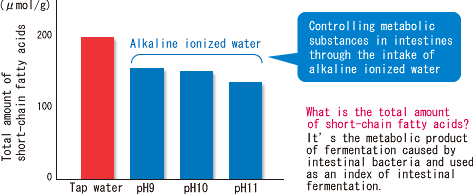
[Hayakawa: FOOD STYLE 21, Food Chemical Journal, Vol. 3, No. 2, pp. 49-55 (1999)]
[Hayakawa, et
al: 7th Functional Water Symposium Tokyo Conference Program – Summary of Lectures, pp. 78-79
(2000)]
[Hayakawa, et al: Functional Water Research Vol. 1, No. 1, p. 45 (2002)]
It was verified that when rats that were raised on calcium-deficient feed drank alkaline ionized water, the calcium concentration in bones increased and bone formation was normalized, which suggested a link to osteoporosis prevention. In addition, the same effect was observed in animal testing using aging-induced mice, and it was verified that alkaline ionized water acted to reduce weakening of the bone structure.
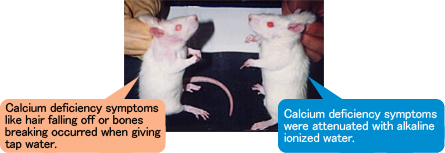
[Itokawa: Japan Oral Functional Water Academics Society Journal, pp. 22-23 (2000)]
[Takahashi, et
al: 6th Functional Water Symposium 1999 Tokyo Conference Program, Summary of Lectures, pp. 8-9
(1999)]
[Takahashi, et al: 7th Functional Water Symposium 2000 Tokyo Conference Program, Summary
of Lectures, pp. 80-82 (2000)]
In testing using rats, it was verified that drinking alkaline ionized water suppressed gastric mucous
membrane damage model (experimental disease induced by aspirin).
However, this effect was verified
only in rats that continually drank alkaline ionized water. (There were no effects when the alkaline
ionized water was given only once.)
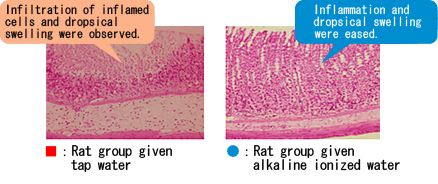
[Yoshikawa, et al: “FRAGRANCE JOURNAL” March issue, pp. 14-17 (1999)]
[Naito, et al: “Functional
Water Research” Vol. 1, No. 1, p. 43 (2002)]
[Y. Naito, T. Yoshikawa, et al: J. Clin, Blochem,
Nutr., 43, 69-81 (2003)]
It was verified that drinking alkaline ionized water provided a life-extending effect in mice and an effect of suppressing lipid peroxides in blood serum, which suggested the possibility of it also having anti-aging effects.
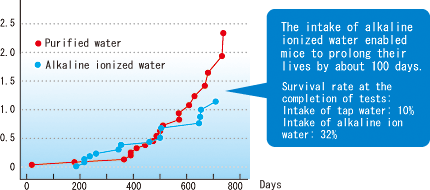
[Suzuki, et al: 8th Functional Water Symposium 2001 Osaka Conference Program, Summary of Lectures,
pp. 34-35 (2001)]
[Nishina, et al: “Functional Water Research” Vol. 1, No. 1, p. 32 (2002)]
(Collaborative research by 2nd Internal Medicine Dept. of Shiga Medical University and Dept. of Gastroenterology, National Ohkura Hospital)
6 volunteers from whom consent was received were given alkaline ionized water at pH9, pH10, and pH11 to drink (1L/day) and the results of measuring pH inside the stomach for 24 hours verified an increase in pH inside the stomach from drinking alkaline ionized water at pH9, which suggested an acid-control effect.
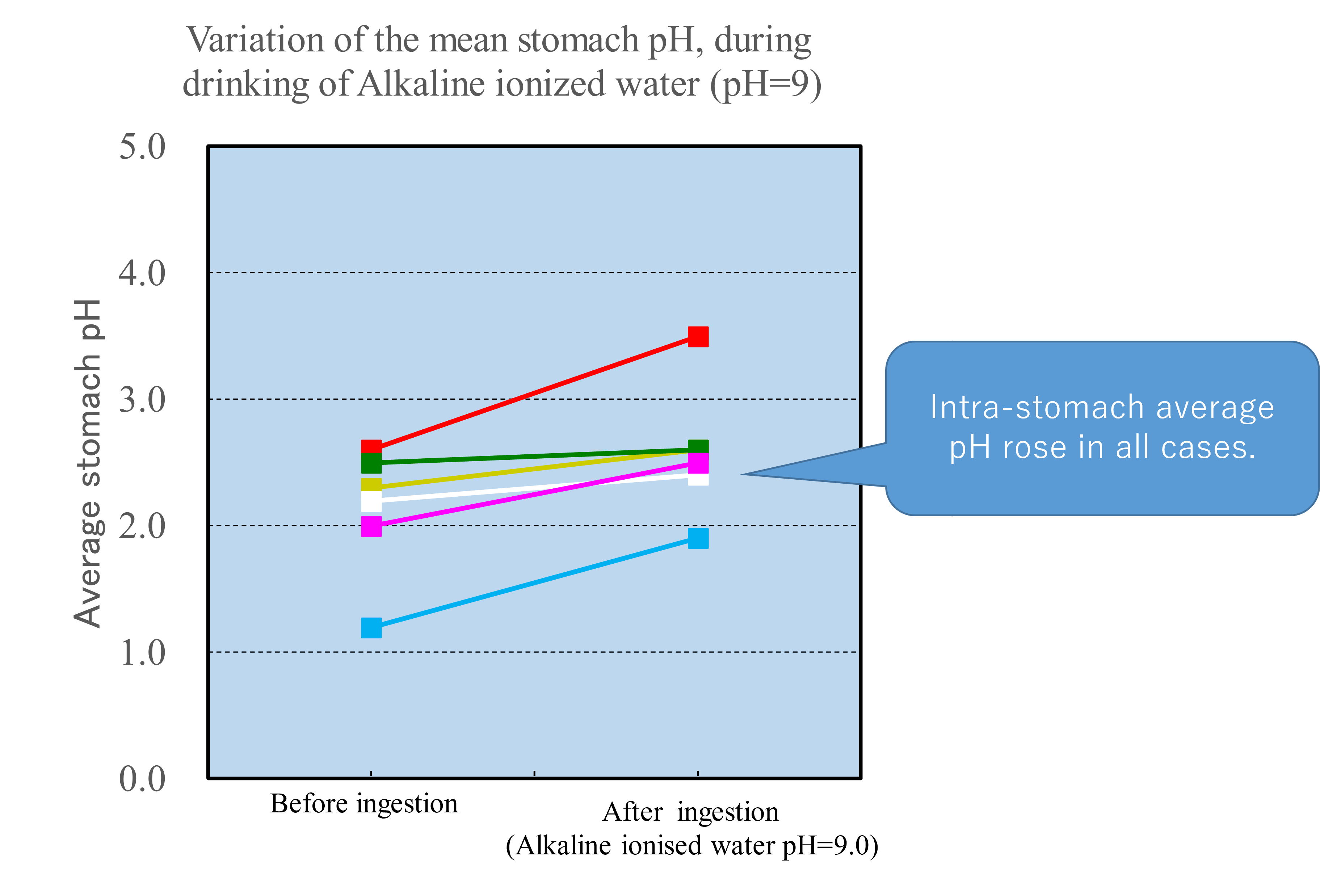
Patients with gastrointestinal symptoms (chronic diarrhea, constipation, abnormal fermentation in intestines, indigestion, acid indigestion, etc.) from whom consent was received were given alkaline ionized water at pH9.5 to drink for 2 weeks, and as a result, it was verified that there was an improvement in 88% of the 25 patients, and further, normalization of bowel movements was also verified.
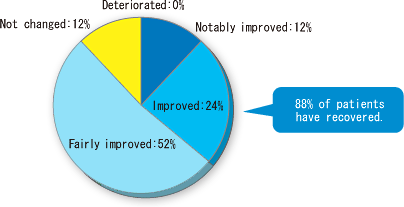
For a more objective evaluation, the “double-blind comparison clinical test” was carried out. Patients with gastrointestinal symptoms from whom consent was received were given alkaline ionized water or purified water to drink for 4 weeks, and the resulting improvement effects were checked. The results revealed that alkaline ionized water was effective for the stomach and intestines, especially for relatively mild cases. The effectiveness for chronic diarrhea and constipation was also confirmed.
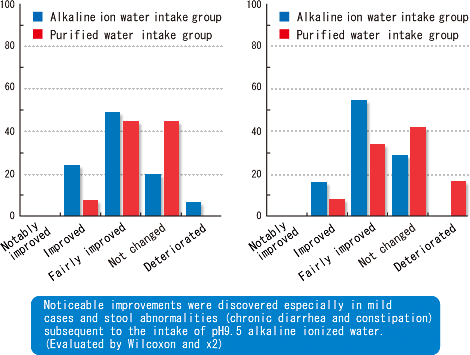
These clinical tests have proven the effectiveness of alkaline ionized water for the stomach and intestines. However, unlike medicine, there’s no promise of an immediate effect. Instead, it is thought that the daily consumption of alkaline ionized water can lead to gentle and gradual effects on the relatively mild cases. Alkaline ionized water must be consumed properly. (Alkaline ionized water is not always effective for all stomach and intestinal conditions.)
[Kitahora, et al: The Summary of “Electrolytic Water in Medical Treatment” at the symposium of the
25th General Assembly of the Medical Congress of Japan (1999)]
[Tashiro, et al: “Digestion and
Absorption” issued by the Japan Digestion and Absorption Academics Society Vol. 23 No. 2, pp. 52-56
(2000)]
[Tashiro: P473-477, 5th Revision of the 32nd Edition of “Digestive Organs” published by
Kagaku Hyoron Sha (2001)]
[Kitahora: Journal (T) of the 26th General Assembly of the Medical
Congress of Japan (p. 33) (2003)]
[Itokawa/ Kikuchi: Functional Water Research Vol. 2, No. 2, p.
59-64/p.65-69 (2004)]
Since alkaline ionized water received approval as a medical device, they have been used for more than 30
years in the market. Although there have been no reported instances of problems with safety until now,
it is necessary to continue performing sufficient investigations regarding its safety, and physical
property tests and toxicity tests were performed prior to performing clinical testing.
In this
section, the results of investigations into the safety of alkaline ionized water performed until now are
briefly introduced.
(Collaborative research by Graduate School of Medicine, Faculty of Medicine, Kyoto University and School
of Engineering, Shiga Prefectural University))
The electrodes, barrier membranes, and electrolysis
promoters used were combined in various ways, and analysis of the byproducts, etc. in the generated
alkaline ionized water such as the dissolved metals, trihalomethane, etc. was performed.
As a result
of this analysis, no major problems in actual use were observed.
(Research by Life Sciences Research Laboratory (GLP-conforming organization))
As a result of testing by giving rats and crab-eating macaques alkaline ionized water to drink for short
terms and long terms, no toxic influences such as harmful phenomenon, etc. were observed.
(Collaborative research by 2nd Internal Medicine Dept. of Shiga Medical University and Dept. of
Gastroenterology, National Ohkura Hospital)
When alkaline ionized water at pH9.5 was drunk, no
abnormalities in either subjective symptoms or objective symptoms were observed, and further, even for
blood analysis, urinalysis, and stool analysis, no abnormal data caused by drinking alkaline ionized
water were observed.
© 2016 アルカリイオン整水器協議会.